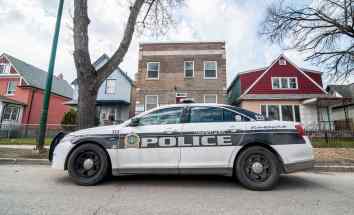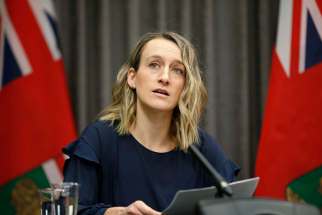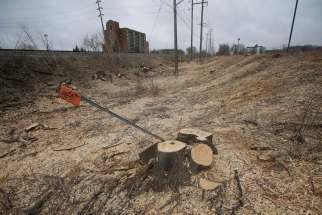Quarantine checks tighter outside Perimeter Winnipeg nearly 15 times the size of Brandon, but police have conducted just 90 more visits in capital city over past 11 months
Read this article for free:
or
Already have an account? Log in here »
To continue reading, please subscribe:
Monthly Digital Subscription
$0 for the first 4 weeks*
- Enjoy unlimited reading on winnipegfreepress.com
- Read the E-Edition, our digital replica newspaper
- Access News Break, our award-winning app
- Play interactive puzzles
*No charge for 4 weeks then price increases to the regular rate of $19.00 plus GST every four weeks. Offer available to new and qualified returning subscribers only. Cancel any time.
Monthly Digital Subscription
$4.75/week*
- Enjoy unlimited reading on winnipegfreepress.com
- Read the E-Edition, our digital replica newspaper
- Access News Break, our award-winning app
- Play interactive puzzles
*Billed as $19 plus GST every four weeks. Cancel any time.
To continue reading, please subscribe:
Add Free Press access to your Brandon Sun subscription for only an additional
$1 for the first 4 weeks*
*Your next subscription payment will increase by $1.00 and you will be charged $16.99 plus GST for four weeks. After four weeks, your payment will increase to $23.99 plus GST every four weeks.
Read unlimited articles for free today:
or
Already have an account? Log in here »
Hey there, time traveller!
This article was published 24/03/2021 (1721 days ago), so information in it may no longer be current.
OTTAWA — An average of 86 Manitobans have returned home from abroad each day this month and faced a legal requirement to self-isolate under the federal Quarantine Act.
But the chance of having police knock at your door depends on where you live, with Manitobans outside Winnipeg much more likely to get a random check.
Winnipeg police have checked on only a few dozen more recently arrived travellers than their colleagues in Brandon, despite having nearly 15 times the population, according to data obtained by the Free Press.
That’s because police forces make these visits as resources allow, and according to a risk level Ottawa assigns to each traveller.
The RCMP says it has managed to make at least one house check for every person isolating in a community served by a detachment, amounting to 5,592 checks, as of March 18.
Since March 25, 2020, returning Canadians who don’t appear on a list of essential workers have been required to isolate for 14 days and have food and necessities brought to their home or hotel room.
Starting last April, Ottawa prepared lists of returning travellers, sorting them on a four-point scale for risk of breaching their quarantine. Manitoba RCMP say they receive 20 to 200 names each day, and pass along the information on local arrivals to the relevant police force or RCMP detachment.
With a wave of snowbirds expected to start migrating home from the southern United States, the Free Press surveyed a handful of police forces about how they’ve enforced the Quarantine Act.
Officials mum on who’s written tickets
At least 11 tickets have been issued to Manitobans under the Quarantine Act, and it appears none have faced charges.
The RCMP say they’ve issued 10 tickets under the Quarantine Act in the past 11 months.
The province has only ever reported five Quarantine Act tickets dating back to Feb. 1, and refused to say which forces had issued each ticket, despite receiving data for its recurring reports.
At least 11 tickets have been issued to Manitobans under the Quarantine Act, and it appears none have faced charges.
The RCMP say they’ve issued 10 tickets under the Quarantine Act in the past 11 months.
The province has only ever reported five Quarantine Act tickets dating back to Feb. 1, and refused to say which forces had issued each ticket, despite receiving data for its recurring reports.
“Due to the number of agencies involved and the ever-evolving enforcement landscape, it is sometimes challenging to capture information consistently. However, in the interest of transparency, we endeavour to provide as much information as possible to keep Manitobans informed about our collective efforts,” a provincial spokeswoman wrote.
Yet media have reported on Altona police issuing a fine to a Plum Coulee man for visiting another province before his 14-day quarantine period had ended.
Meanwhile, officials disclosed a month ago that one of Manitoba’s first detected carriers of the highly contagious and deadlier B.1.1.7 strain of COVID-19 racked up 27 contacts after returning from abroad, but the lack of data from the province makes it impossible to tell if this person got a ticket.
“Manitoba supports a strengthened response to international travel in an attempt to keep everyone safe including from variants. However, we don’t provide details on any specific cases, beyond posting business infractions,” a spokeswoman wrote.
Ottawa is also not able to fully explain how the Quarantine Act is being enforced.
“Local police conduct follow-ups with travellers, and are not required to report the results of these activities to the Public Health Agency of Canada,” wrote agency spokeswoman Tammy Jarbeau.
Yet she noted that at least 212 tickets and eight criminal charges had been laid nationally, as of March 5.
“The frequency of on-site compliance visits by law enforcement is based on operational requirements and priorities of each law enforcement unit. Individuals who contravene the mandatory isolation or mandatory quarantine requirements may be subject to a range of enforcement measures, which include verbal and written warnings, and fines.”
Winkler Deputy Police Chief Chris Kalansky said his force has issued four warnings for people who made minor breaches of the Quarantine Act, saying tickets would be issued if someone knowingly created a risk to others.
“We found a violation, based on the totality of circumstances, to be minor in nature, and our officers at the time that were there felt like a verbal warning was sufficient to deal with that. These are usually just a misunderstanding, or something like that,” he said.
— Dylan Robertson
The RCMP says it has managed to make at least one house check for every person isolating in a community served by a detachment, amounting to 5,592 checks, as of March 18.
The Winnipeg Police Service says its officers have done 712 checks in the past 11 months, and that the WPS generally limits checks to people in the two higher-risk levels of the four set by Ottawa.
Brandon police say they’ve completed 622 checks in the same time frame.
The Brandon Police Service says it has managed to reach all of the returned travellers during their 14-day quarantine period, with those Ottawa has deemed higher risk more likely to get multiple visits.
“We can prioritize around that, and do the checks when there’s time,” said Sgt. Kirby Sararas.
Winkler’s police force says it has had 154 files involving 200 people, including about 125 addresses. The rest were closed after someone returned to the United States, couldn’t be connected to an address or had been ranked by Ottawa as a low priority.
The Winnipeg Police Service says its officers have done 712 checks in the past 11 months, and that the WPS generally limits checks to people in the two higher-risk levels of the four set by Ottawa.
“It does take up time, and we’ve noticed that, obviously,” said deputy chief Chris Kalansky.
The Public Health Agency of Canada said that between March 1 and 20, 1,723 people entered the country listing a quarantine address in Manitoba, an average of 86 people each day.
“Of these, 1,118 entered via air and were required to stay in a government (hotel) until a negative test result was received. The remainder arrived by land,” wrote PHAC spokesman André Gagnon.
Many more people have entered the province without having to quarantine, due to exceptions for essential workers such as truck drivers, according to national data from the Canada Border Services Agency.
“Between March 31, 2020, and March 5, 2021, approximately 93 per cent of travellers in land mode have been exempt from quarantine,” wrote spokesman Louis-Carl Brissette Lesage, referring to Canada’s entire land border.
The police forces and province wouldn’t speculate on whether the return of snowbirds would require an increase in checks.
— With files from Danielle Da Silva
dylan.robertson@freepress.mb.ca
History
Updated on Wednesday, March 24, 2021 7:04 PM CDT: formats fact box








